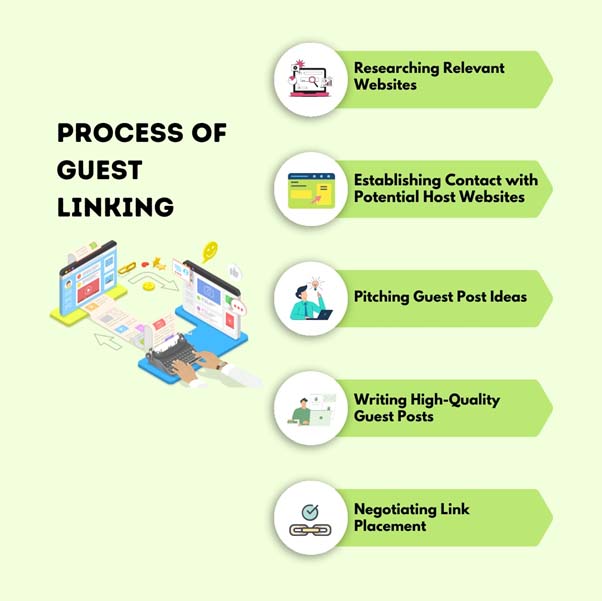What are guest links?
Guest links, also known as guest posts or guest blogging, are articles or blog posts written by someone who is not a regular contributor to a website or blog. These posts are typically written by experts or influencers in a particular field and are published on other websites to reach a new audience and gain exposure.

In simple terms, it’s like being invited to write an article for someone else’s blog or website. Guest links are beneficial because they allow writers to share their knowledge and insights with a wider audience, while also building credibility and authority in their niche. A guest link can be a good link building strategy for SEO because guest links help your website improve its SEO score, visibility in the SERPs, and drive targeted traffic to your website.
Importance of guest linking
Guest linking plays a crucial role in digital marketing and SEO by helping websites improve their visibility and credibility on search engines like Google. When one website links to another, it’s like a vote of confidence. Search engines see these links as signals that a website is trustworthy and valuable, which can boost its ranking in search results.
Firstly, guest linking expands a website’s reach. By getting links from other sites, a website can tap into new audiences who may not have found it otherwise. For example, if a cooking blog gets a link from a popular food website, it exposes the cooking blog to the food website’s audience, potentially bringing in more visitors and customers.

Secondly, guest linking enhances a website’s authority. When reputable websites link to yours, it tells search engines that your site is a reliable source of information. This can lead to higher rankings in search results, making it easier for people to find your website when they search for relevant topics.
Moreover, guest linking fosters relationships within your industry. When you collaborate with other websites through guest linking, you’re building connections with influencers and experts in your field. These relationships can open doors to future opportunities like collaborations, partnerships, or even guest appearances on podcasts or webinars.
Furthermore, guest linking can drive referral traffic to your website. When people click on links from other sites and land on yours, it can result in more visitors and potential customers. This not only increases your website’s visibility but also gives you the chance to convert those visitors into loyal followers or customers.
In essence, guest linking is a powerful strategy in digital marketing and SEO because it helps websites reach new audiences, build authority, foster relationships, and drive valuable traffic. By incorporating guest linking into your marketing efforts, you can strengthen your online presence and achieve long-term success.
The process of guest linking
1. Researching Relevant Websites: Before reaching out to any website, it’s important to do some homework. Look for websites that are related to your niche or industry. These websites should have a good reputation and a decent audience. Make a list of potential host websites that align with your content and target audience.
2. Establishing Contact with Potential Host Websites: Once you have your list, it’s time to reach out. Find the contact information for the website owners or editors. You can usually find this information on the website’s “Contact Us” page or through social media platforms. Send a polite and professional email introducing yourself and expressing your interest in contributing a guest post.

3. Pitching Guest Post Ideas: In your email, include a brief pitch outlining your guest post idea. Make sure it’s relevant to the host website’s audience and adds value to their content. Highlight why your post would be a great fit for their site and how it could benefit their readers. Keep your pitch concise and engaging to capture their attention.
4. Writing High-Quality Guest Posts: Once your guest post idea is approved, it’s time to get writing. Focus on creating high-quality content that is informative, well-researched, and engaging. Write in a clear and concise manner, making sure to follow any guidelines provided by the host website. Use proper formatting, subheadings, and images to enhance readability.
5. Negotiating Link Placement: After writing your guest post, it’s common to negotiate the placement of links within the content. Be clear about where you want your links to be placed and why. Remember that the goal is to provide value to both the host website and its readers. Avoid overly promotional language and focus on creating a mutually beneficial arrangement.
How to build guest post links?
Guest post links, also known as guest blogging, are a valuable way to expand your online presence, reach new audiences, and improve your website’s search engine rankings. Here’s a straightforward guide on how to build guest post links effectively:
1. Identify Target Websites: Start by identifying websites in your niche that accept guest posts. Look for websites that have a similar audience to yours and are reputable in your industry.
2. Research Content Topics: Before reaching out to potential websites, research relevant topics that would resonate with their audience. Focus on providing value and solving problems for their readers.
3. Craft a Compelling Pitch: Write a personalised email pitch to the website owner or editor, introducing yourself and proposing your guest post idea. Be concise, professional, and highlight why your content would be beneficial for their audience.
4. Follow Submission Guidelines: Many websites have specific submission guidelines for guest posts. Make sure to carefully read and follow these guidelines to increase your chances of acceptance.
5. Write High-Quality Content: Once your pitch is accepted, focus on writing high-quality content that provides valuable insights and engages the audience. Make sure your content is well-researched, well-written, and free of grammatical errors.
6. Include Relevant Links: Within your guest post, include relevant links to your own website or other reputable sources to provide additional value to the reader. However, avoid overlinking, as this can appear spammy.
7. Promote Your Guest Post: After your guest post is published, promote it on your own social media channels and website to drive traffic back to the host website. This not only benefits the host website but also increases your visibility as a guest contributor.
8. Build Relationships: Building relationships with website owners and editors is key to long-term success with guest post links. Follow up with a thank-you email after your post is published and consider pitching future ideas.
9. Monitor Performance: Keep track of the performance of your guest posts by monitoring metrics such as website traffic, engagement, and search engine rankings. This will help you assess the effectiveness of your guest post strategy and make adjustments as needed.
10. Rinse and Repeat: Building guest post links is an ongoing process. Continue to identify new target websites, pitch relevant topics, and contribute valuable content to expand your online presence and drive traffic to your website.
Best practices for guest posting
1. Creating Valuable Content for Host Websites: Make sure the content you offer to other websites is helpful, informative, and adds value to their audience. It should be well-researched, engaging, and tailored to their readers’ interests.
2. Maintaining Authenticity and Relevance in Guest Posts: Keep your guest posts genuine and relevant to the host website’s theme or niche. Avoid overly promotional content and focus on providing genuine insights or solutions to their audience’s problems.
3. Following Host Website Guidelines: Always adhere to the guidelines provided by the host website for guest posting. This ensures your content meets their standards and increases the chances of acceptance.
4. Building Relationships With Host Website Owners/Editors: Take the time to establish rapport with the owners or editors of the host websites. Engage with them professionally, offer value beyond guest posts, and foster genuine relationships for future collaborations.
5. Monitoring and Evaluating Guest Linking Efforts: Regularly track the performance of your guest posts in terms of traffic, engagement, and link metrics. Evaluate what works well and what needs improvement to refine your guest linking strategy over time.
Challenges
Guest linking can be a helpful tool for boosting a website’s visibility, but it’s not without its challenges. Here are some common hurdles one might face:
1. Rejections and Low Response Rates: Not every website you reach out to will accept your guest post idea or even respond to your inquiry. This can be frustrating and time-consuming.
2. Ethical Concerns: Some websites might engage in unethical linking practices, such as selling links or using black hat SEO techniques. Associating with these sites can harm your own website’s reputation and could even lead to penalties from search engines.
3. Search Engine Penalties: Search engines like Google have strict guidelines for guest linking. If you violate these guidelines by engaging in spammy or manipulative linking practices, your website could face penalties, including lower search rankings.
4. Competition: Many other websites are also trying to build backlinks through guest linking. This means you’ll be competing with them for opportunities, and it can be tough to stand out from the crowd.
To overcome these challenges, it’s important to focus on creating high-quality, valuable content that genuinely benefits the websites you’re reaching out to. Building genuine relationships with website owners and editors can also increase your chances of success.
What are the future trends?
1. More Focus on Quality Content: In the future, guest linking will place even more emphasis on creating high-quality, valuable content. Search engines are getting smarter at recognizing quality content, so websites will prioritize posts that offer real value to their readers. This means guest posters will need to invest more time and effort into crafting engaging and informative articles.
2. Personalized Outreach: With advancements in data analytics and AI, guest linkers will increasingly personalize their outreach efforts. Instead of sending generic pitches to hundreds of websites, they’ll tailor their pitches based on the interests and preferences of each website’s audience. This personalised approach can lead to higher acceptance rates and better relationships with host websites.
3. Integration with Influencer Marketing: Influencer marketing is on the rise, and it’s likely to intersect more with guest linking in the future. Brands may collaborate with influencers to create guest posts that resonate with their followers. This can help expand their reach and credibility within specific niches.
4. Visual and Interactive Content: As internet users crave more engaging experiences, guest linking will incorporate more visual and interactive content. This could include infographics, videos, quizzes, and interactive tools. Host websites will be more inclined to accept guest posts that offer unique and interactive content experiences for their audience.
5. Emphasis on Diversity and Inclusivity: Diversity and inclusivity will become increasingly important in guest linking efforts. Brands and websites will seek out guest posters from a wide range of backgrounds and perspectives to ensure their content resonates with diverse audiences. This will not only improve the quality of content but also contribute to building a more inclusive online community.
Conclusion
In conclusion, guest posting is a powerful tool for building relationships, expanding reach, and boosting credibility in the digital world. By offering valuable content to other websites, individuals and businesses can attract more visitors, improve their online presence, and strengthen their authority in their niche. As guest posting continues to evolve, it remains an essential strategy for achieving success in digital marketing and SEO.